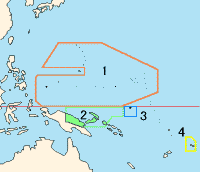South Seas Agency
| South Pacific Mandate | ||||||||||
|
南洋群島 Nan'yō Guntō |
||||||||||
| Mandate of the Empire of Japan | ||||||||||
|
||||||||||
|
League of Nations mandates in the Pacific. The South Pacific Mandate is number 1.
|
||||||||||
| Capital | Koror | |||||||||
| Languages |
Japanese (official) Austronesian languages |
|||||||||
| Political structure | Mandate of the Empire of Japan | |||||||||
| Emperor | ||||||||||
| • | 1919–1926 | Taishō (Yoshihito) | ||||||||
| • | 1926–1947 | Shōwa (Hirohito) | ||||||||
| Governor | ||||||||||
| • | 1919–1923 (first) | Toshirō Tezuka | ||||||||
| • | 1943–1946 (last) | Boshirō Hosogaya | ||||||||
| Historical era | Empire of Japan | |||||||||
| • | Treaty of Versailles | June 28, 1919 | ||||||||
| • | Pacific Islands Trusteeship | July 18, 1947 | ||||||||
| Currency | Yen, Oceanian Pound | |||||||||
|
||||||||||
| Today part of |
|
|||||||||
The South Pacific Mandate was a League of Nations mandate given to the Empire of Japan by the League of Nations following World War I. The South Pacific Mandate consisted of islands in the north Pacific Ocean that had been part of German New Guinea within the German colonial empire until they were occupied by Japan during World War I. Japan governed the islands under the mandate as part of the Japanese colonial empire until World War II, when the United States captured the islands. The islands then became the United Nations-established Trust Territory of the Pacific Islands governed by the United States. The islands are now part of Palau, Northern Mariana Islands, Federated States of Micronesia, and Marshall Islands.
In Japan, the territory is known as "Japanese mandate for the South Seas Islands" ( Nihon Inin Tōchi-ryō Nan'yō Guntō) and was governed by the Nan'yō Government (南洋庁 Nan'yō Chō).
Japan has few natural resources, and the shortage of raw materials during industrialisation in the Meiji Restoration period (1868–1912) meant that the development of the Japanese colonial empire was considered a political and economic necessity. By the outbreak of WWI the empire included Taiwan, Korea, the Ryukyu Islands the southern half of Sakhalin island, the Kuril Islands, and Port Arthur (Dalian). The policy of Nanshin-ron ("Southern Expansion Doctrine"), popular with the Imperial Japanese Navy, held that Southeast Asia and the Pacific Islands were the area of greatest potential value to the Japanese Empire for economic and territorial expansion.
...
Wikipedia



